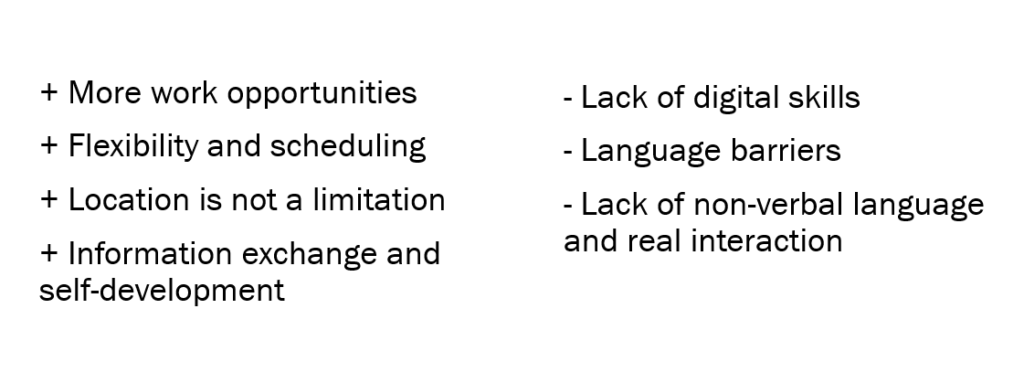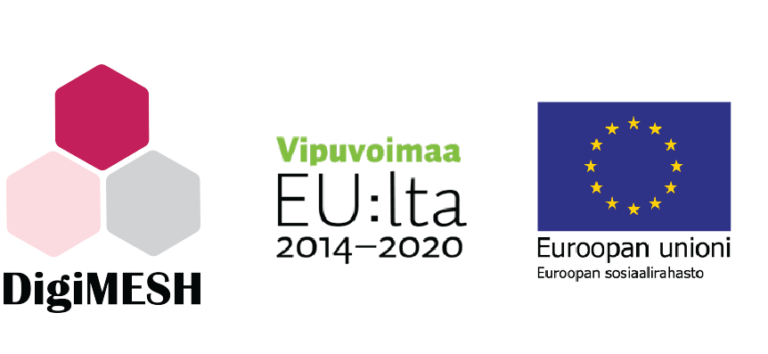What do professionals and highly educated immigrants think of digital networking?

To identify problems encountered by highly educated immigrants and professionals, but also the possibilities, The DigiMESH collected their perceptions and experiences on digital networking for improvement purposes. To achieve our goal, interviews with the professionals and highly educated immigrants were conducted to investigate the topic and collect information to design solutions for the future. Students of Turku UAS conducted the interviews with the international talents and professionals guiding them in the spring of 2022.
Three individual interviews were made with professionals from different public organisations, whereas only one highly educated immigrant was interviewed. To come up with straightforward results, those were organized depending on whether they pointed out positive or negative sides of digital networking, as well as replies concerning what the most used digital platforms are and ideas to improve the digital networking.
Benefits and disadvantages of digital networking
 On the one hand, the professional interviewees claimed that digital networking is important for immigrants, and it gives more work opportunities and advantages for finding a job. Moreover, the schedules are easier to arrange, combining the networking with family life and work or studies is also easier. At the same time, it is convenient to attend events or meetings even though the participants may not live near each other. There are also opportunities to get to know people through networks and networking is part of exchanging information. Digital networking webinars, such as training in the use of LinkedIn, have been beneficial for students, and they develop their knowledge and skills. Finally, there has been an increase in the use of digital networks, so it is an advantage if the users know beforehand how to use different tools or platforms.
On the one hand, the professional interviewees claimed that digital networking is important for immigrants, and it gives more work opportunities and advantages for finding a job. Moreover, the schedules are easier to arrange, combining the networking with family life and work or studies is also easier. At the same time, it is convenient to attend events or meetings even though the participants may not live near each other. There are also opportunities to get to know people through networks and networking is part of exchanging information. Digital networking webinars, such as training in the use of LinkedIn, have been beneficial for students, and they develop their knowledge and skills. Finally, there has been an increase in the use of digital networks, so it is an advantage if the users know beforehand how to use different tools or platforms.
On the other hand, the negative sides are the lack of training, since not everyone has digital skills, and the insufficient knowledge and language skills can affect employment. In addition, in meetings that take place online, it is more difficult to have a proper conversation and interaction, in terms of non-verbal language and cues, for example. Also, asking for help or interrupting if questions come to mind is challenging.
Room for improvement
In terms of improving digital networking, the ideas that came up were mainly focused on training for professionals, for example about facilitation skills and the use of different tools to have more knowledge when guiding their customers. Moreover, ideas for improving the online events even more were brought up, like thinking more about the schedule of the meeting, how to function in small groups and how to gather everyone’s thoughts together. Considering when a digital option is better than meeting face-to-face; which provides added value to the meeting was also mentioned. Last, in the future, there could be more digital tools on the market for networking that could be used for various events. These tools could be useful for remote participants and those who do not want to openly share information about themselves on a discussion platform.
The professionals in Finland have quite wide knowledge about the most common platforms. The most used platforms by professionals are video platforms, such as Teams, Zoom and Google Meet, LinkedIn, learning platforms, such as Moodle, and social media, like Facebook and Twitter. The need for training mostly concerns guiding customers in digital networking and facilitating online events.
A student’s point of view
Regarding the answers of the highly educated immigrant interviewed, digital networking stands as a way not only to build professional relationships, but also personal ones by socializing through the opportunities provided by social media platforms such as Facebook and LinkedIn. Those two, along with Slack, seem to be the most used social networking websites. Nevertheless, some challenges were brought to light. In online meetings, there are difficulties with reading and interpreting body language, which makes it socially unmanageable to properly and fluently connect with the people met online. Furthermore, students are more open on campus than in virtual meetings or lectures, complicating the understanding of the information received and the evolution of new relationships.
However, some benefits were presented. The connections can extend globally, which offers the opportunity to develop a career by getting a hold of new job opportunities that otherwise would not be available. Finally, in terms of improvements for the future, it should be easier to identify scammers and hackers to guarantee a safe space to work, study and meet people.
What’s next?
These results serve as an idea for what is needed for both the highly educated immigrants and the professionals who guide them. The interviews served a good insight, but the project may conduct more interviews or surveys later to get a deeper understanding about the needs and wishes of these target groups.
However, these ideas will serve the next activities and outputs of the project. DigiMESH will plan to organize trainings for professionals about digital networking and offer more online events to promote possibilities to international talents and students to build their networks.
Writers:
Sarah Badosa Roldós, exchange student from the University of Barcelona, Spain, Turku University of Applied Sciences
Iria Prieto Araújo, exchange student from the University of Oviedo, Spain, Turku University of Applied Sciences
Janna Peltola, specialist, Turku University of Applied Sciences
Photo:
Vanessa Garcia / Pexels
